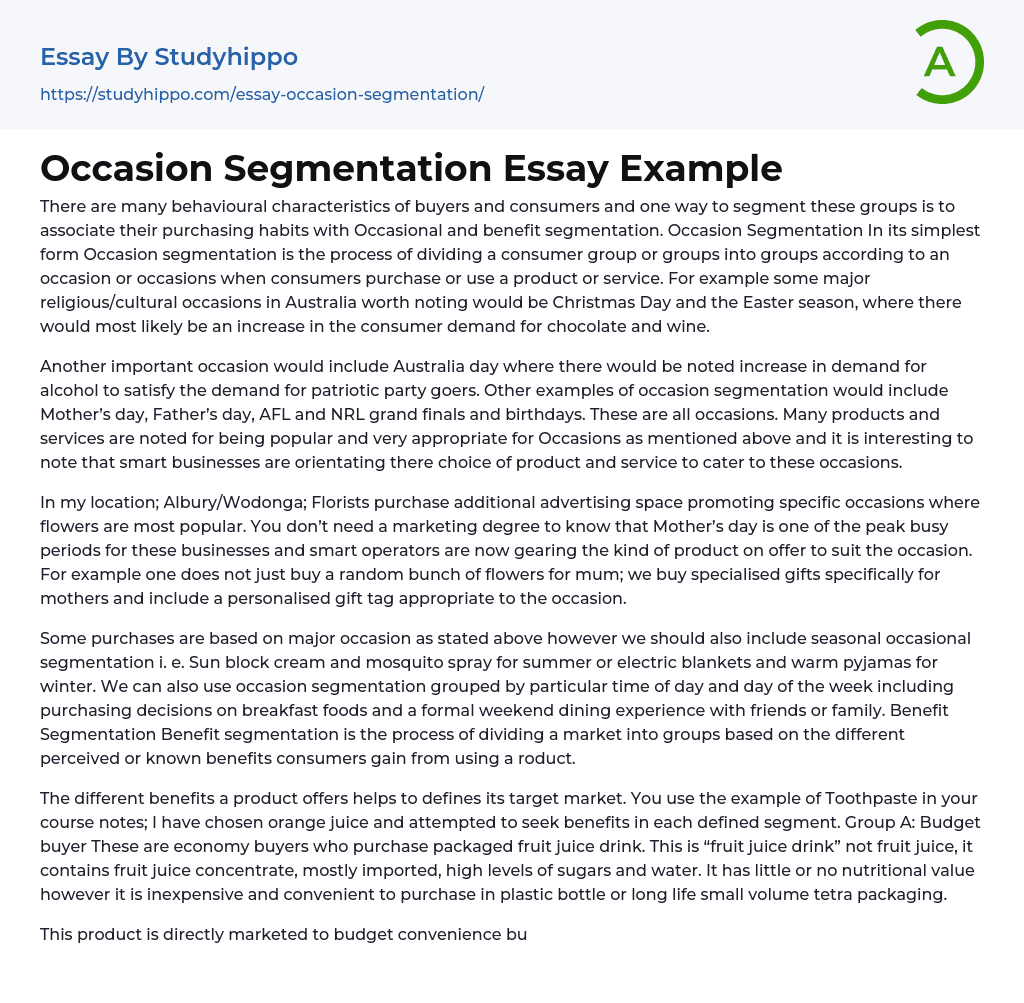There are various behavioural characteristics of buyers and consumers, and one method of categorizing them is by associating their purchasing habits with Occasional and benefit segmentation. Occasion Segmentation involves dividing a consumer group or groups based on the occasions when they purchase or use a product or service. For instance, in Australia, notable occasions include Christmas Day and the Easter season, during which there is typically a higher demand for chocolate and wine.
Occasion segmentation is significant for various events, such as Australia Day, where there is a noticeable surge in the demand for alcohol to accommodate patriotic party goers. Other instances of occasion segmentation encompass Mother's Day, Father's Day, AFL and NRL grand finals, and birthdays. These events all constitute occasions where numerous products and services gain popularity and prove to be highly suitable. It is
...intriguing to observe that astute businesses are aligning their selection of products and services to cater to these occasions.
In my area, Albury/Wodonga, florists use extra advertising space to promote specific occasions when flowers are in high demand. It's common knowledge that Mother's Day is one of the busiest times for these businesses, and savvy operators are now tailoring their products to suit the occasion. Instead of just buying a random bouquet of flowers for mom, we now purchase specialized gifts designed specifically for mothers and include a personalized gift tag that is fitting for the occasion.
Some purchases are based on major occasions, as stated above. However, we should also consider seasonal occasional segmentation, such as sun block cream and mosquito spray for summer or electric blankets and warm pajamas for winter. Additionally, we can utilize occasion segmentation based on
specific times of day and days of the week. This includes purchasing decisions for breakfast foods and formal weekend dining experiences with friends or family. Benefit segmentation involves dividing a market into groups based on the various perceived or known benefits consumers receive from using a product.
The different benefits a product offers help define its target market. For example, in your course notes, you use Toothpaste as an example. In my case, I have chosen orange juice and examined the benefits for each defined segment.
Group A: Budget buyers - These are economy buyers who purchase packaged fruit juice drinks. These drinks are not pure fruit juice but rather contain fruit juice concentrate, mostly imported, and high levels of sugars and water. They have little or no nutritional value. However, they are inexpensive and convenient to purchase in plastic bottles or long-life small volume tetra packaging.
This product is specifically targeted towards budget convenience buyers who do not prioritize high nutritional value. Group B: Convenience buyer Have you ever been in the situation where you have visitors staying with you and not enough oranges to make fresh juice for Sunday Breakfast? Fortunately, we can buy reasonably good quality packaged fruit juice from our nearby supermarket. Some of these juices are made from fruit juice concentrate, but nowadays there are various well-known brands available that profess to be freshly squeezed. These brands include Golden Circle, Ducats, and Daily Juice Company, among others.
These products are more expensive than those in group A, but the perceived benefit is convenience with a better or fresher product. Group C believes that there is no substitute for the real thing, as the
product benefits of taste, health, and freshness outweigh the convenience offered by products purchased by consumers in groups A and B. For users/squeezers, the raw price of oranges would have to be extremely high to change their buying habits. For this group, there is simply no substitute for quality - the perceived benefit is freshness, quality, and health.
- Chief Executive Officer essays
- Convenience Store essays
- Firm essays
- Training And Development essays
- Unilever essays
- Variable Cost essays
- Virgin Group essays
- Bargaining essays
- Entity essays
- Pest analysis essays
- Leadership and Management essays
- Change Management essays
- Project Management essays
- Knowledge Management essays
- Operations Management essays
- Quality Management essays
- Risk Management essays
- Scientific Management essays
- supply chain management essays
- Performance Management essays
- Time Management essays
- Brand Management essays
- Total Quality Management essays
- Risk essays
- Manager essays
- Leadership essays
- Business Ethics essays
- Board Of Directors essays
- Product Management essays
- Comparative Analysis essays
- Decision Making essays
- Dispute Resolution essays
- Stress Management essays
- Business Management essays
- Brand Equity essays
- Branding essays
- Nike, Inc. essays
- Market share essays
- Razor essays
- Being A Leader essays
- Servant Leadership essays
- Leadership Experience essays
- Leadership Qualities essays
- Incentive essays
- Offer And Acceptance essays
- John Locke essays
- 9/11 essays
- A Good Teacher essays
- A Healthy Diet essays
- A Modest Proposal essays




